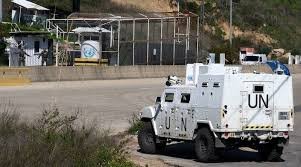Introduction to the Security Council’s Statement
In recent times, the United Nations Security Council (UNSC) issued an important press statement that underscores the necessity of honoring Lebanon’s sovereignty. This declaration comes amidst ongoing discussions surrounding the global expectations regarding state autonomy and territorial integrity. The Security Council, as a principal organ of the UN responsible for maintaining international peace and security, plays a crucial role in reinforcing the norms that govern state interactions and sovereignty.
Lebanon’s sovereignty is of critical importance, not only to its government but also to international relations within the Middle East. Acknowledging territorial integrity is fundamental to ensuring that nations can operate independently, free from external interventions that may destabilize their political systems. The recent statement by the UNSC accentuates this notion, reinforcing the idea that adherence to sovereignty is an essential principle that should guide both domestic policies and international collaborations.
The role of the UNSC in supporting Lebanese sovereignty reflects broader expectations within the international community about statehood and territorial claims. Different stakeholders, including other member states, regional organizations, and civil society, are often involved in discussions surrounding Lebanon’s political landscape. Their involvement serves to reinforce the commitment to Lebanon’s autonomy and to promote stability in the region.
Moreover, the press statement highlights the need for the Lebanese government to uphold its responsibilities in maintaining a unified and sovereign state, free from external pressures that threaten national stability. It is crucial for the government to engage in dialogue with all pertinent sectors of society to foster cooperation and collective responsibility toward preserving the essential principle of sovereignty. This multifaceted approach is vital for ensuring Lebanon’s future stability and governance.
Lebanon’s Commitment to Sovereignty
Lebanon has consistently demonstrated its commitment to maintaining sovereignty over its territory, a principle deeply embedded in its national policy. The Lebanese government emphasizes the pivotal role of the Lebanese Armed Forces (LAF) in reaffirming this sovereignty. The LAF operates not only as a military institution but also as a symbol of national unity and authority. By asserting control over Lebanon’s borders and internal security, the LAF plays a crucial role in preventing external interferences that could undermine the nation’s independence.
In recent years, the Lebanese government has undertaken various initiatives to strengthen its sovereignty. For instance, the enhancement of military capabilities, training programs, and strategic partnerships with international allies reflect the government’s determination to ensure that no other authority exists beyond its recognized governance. The consolidation of authority is paramount in a region marred by various factions and external influences, which can potentially threaten sovereign integrity.
The Lebanese government’s approach towards sovereignty also involves efforts to foster cooperation among different political factions within the country. By promoting dialogue and political stability, the government strives to create an environment where effective governance can flourish, thereby ensuring that power and authority remain firmly within the state apparatus. This initiative is critical as it seeks to mitigate the influence of non-state actors and align various groups to respect the constitutional framework established in Lebanon.
Complementary to these efforts, Lebanon has also engaged in international forums to seek recognition and support for its sovereignty. Through participation in global discussions, Lebanese authorities highlight their commitment to maintaining a cohesive state structure that prioritizes national interests above all else. This not only reinforces Lebanon’s international standing but also underpins its dedication to sovereignty as a fundamental aspect of its governance.
International Community’s Role and Support
The call for enhanced support for the Lebanese Armed Forces (LAF) is pivotal in the context of Lebanon’s evolving security landscape. The international community plays a crucial role in providing various forms of assistance that are essential for the LAF’s operational effectiveness and sovereignty. This support includes financial aid, military training, and logistical resources, which collectively contribute to ensuring that the LAF remains a capable security force dedicated to maintaining stability within the nation.
One of the most significant areas that requires attention is the sustainable deployment of LAF troops, particularly in sensitive regions such as south of the Litani River. This geographical area has historically been subject to various security challenges, necessitating a robust military presence to uphold law and order. Enhanced international support is vital for enabling the LAF to establish a stable security environment, which is a fundamental prerequisite for Lebanon’s political stability. A capable and well-supported LAF can act as a stabilizing force and mitigate the influence of non-state actors, thereby fostering a more peaceful coexistence among Lebanon’s diverse communities.
Furthermore, it is essential to emphasize the backing of the United Nations Interim Force in Lebanon (UNIFIL). This peacekeeping mission, which operates in conjunction with the LAF, requires consistent support from the international community to fulfill its mandate effectively. Protecting peacekeeping personnel and ensuring their operational safety is of paramount importance, as it allows them to carry out their tasks without disruption. The collaboration between the LAF and UNIFIL creates a framework in which sustainable peace can be pursued, thus enhancing regional security efforts and reinforcing Lebanon’s sovereignty.
In summary, the international community’s active support is indispensable in strengthening the Lebanese Armed Forces, ensuring enduring stability, and protecting peacekeeping objectives centrally focused on Lebanon’s long-term security and sovereignty.
Compliance with International Commitments and Humanitarian Law
The cessation of hostilities arrangement established in November 2024 represents a significant diplomatic effort aimed at maintaining peace and ensuring the protection of civilians within Lebanon and its bordering regions. All involved parties are obligated to adhere to this agreement, which plays a crucial role in stabilizing the region and mitigating tensions that could result in further conflict. Compliance with the cessation of hostilities is not solely a matter of legal obligation but is vital for fostering trust and promoting a sustainable peace between conflicting parties.
International humanitarian law (IHL) mandates that all parties involved in conflicts must respect and ensure respect for the rules designed to protect individuals who are not participating in hostilities. This includes civilians who are vulnerable during conflicts, particularly in areas where border security and smuggling concerns are at the forefront. The specific commitments made under the cessation of hostilities agreement require parties to refrain from attacks against civilian infrastructure and ensure the delivery of humanitarian assistance to those in need. This commitment is essential for the protection of civilian lives and properties, reaffirming the international community’s stance on the impermissibility of targeting innocents.
Moreover, Lebanon’s ongoing efforts to clearly define its borders with Syria are integral to combatting cross-border smuggling, which exacerbates tensions and undermines national security. Establishing recognized boundaries is crucial for reinforcing Lebanon’s sovereignty and ensuring that the flow of goods and arms does not disrupt regional stability. Enhancing border security contributes to adhering to international commitments, facilitating dialogue and cooperation with neighboring countries, while addressing the root causes of security challenges. Compliance with international standards and law, therefore, is not only essential for Lebanon’s internal stability but also for the broader implications it has on regional security and peace.




